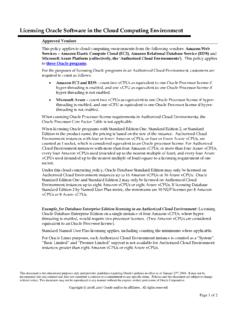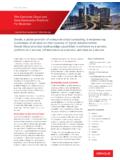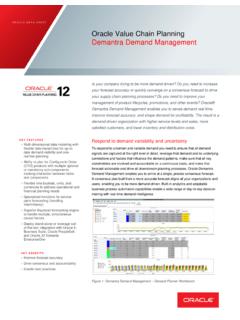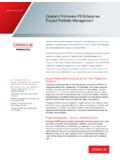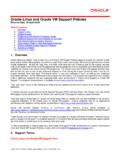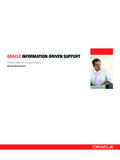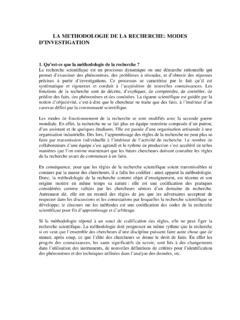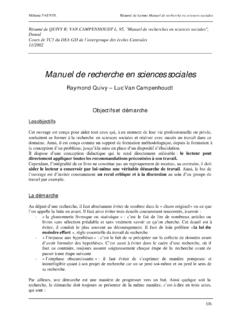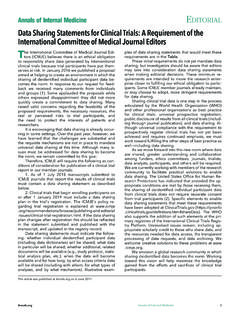Transcription of The CFO as Catalyst for Change - Oracle
1 The CFO as Catalyst for Change How finance can take the lead in business transformationExEcutivE SummaryExEcutivE SummaryAbOuT This repOrTFor this report, we conducted a series of in-depth interviews with cFOs from leading companies based in every major region. in addition, we conducted an online global survey of cFOs that attracted 930 respondents in total. Of these, 270 (29%) were from Western Europe, 205 (22%) from North america, 160 (17%) from Eastern Europe, 150 (16%) from asia-Pacific, 95 (10%) from the middle East and africa, and 50 (6%) from Latin america. Half of the respondents represented companies with annual revenues in excess of uS$1bn, with the remainder at companies with revenues between uS$250m and uS$ CFOs surveyed across asia, Europe, Latin america and North america exeCuTive summAryThe role of the CFO continues to evolve.
2 Tasked with steering their businesses through the worst economic times since the Great Depression, CFOs used their expertise in cost management and operational efficiency to ensure the survival of their organizations. Those who succeeded earned the respect and confidence of executive management, the market, and external shareholders, helping to elevate the role of CFO from financial steward to corporate strategist and Change , CFOs must find new ways to sustain performance and grow the business. Rapid technological Change , the rise of emerging markets, more empowered consumers and employees, and more active government intervention have all combined to disrupt traditional business models worldwide.
3 As their influence has grown, increasingly it falls upon the CFO to not only manage disruption, but to also identify and invest in the business models, products, and services that will lead to sustainable, profitable tools and structures that served finance leaders well in the past may no longer work so well. Cost levers that used to be effective are becoming less so, as margins become squeezed and incremental operational efficiencies are harder to uncover. Volatility makes it more challenging to set priorities and plan for future investments. Complex organizational structures hamper the ability of CFOs to gain visibility into performance across the enterprise.
4 And disruptive technologies, such as big data, cloud computing, mobile and social media, have given rise to new forms of competition that are challenging even the most established enterprises. Longitude Research commissioned by Oracle and Accenture recently surveyed 930 CFOs across Asia, Europe, Latin America, and North America to understand how finance executives are leveraging their growing influence to manage Change and drive growth in this disruptive environment. What we learned was surprising: despite their increased profile, CFOs realize that their role as corporate Catalyst remains incomplete. They recognize that there is still insufficient collaboration between the finance function and the business, and that they are not playing as significant a role as they would like in either strategy or business then should CFOs address these challenges?
5 While the past few years have brought uncertainty and volatility, they have also provided CFOs with a unique opportunity to demonstrate their abilities in a whole range of strategic areas. Above all, the work that many have already completed has given them a platform to drive Change across the whole business, not just within the finance function. In short, they should assume the role as the key Catalyst for Change across the entire thanks to all survey participants and to the following individuals in particular for their time and insights: Sandip Parikh, Head of Finance & Operations, Reliance Commercial Finance (India) Ken Gregor, CFO, Jaguar Land Rover (UK) Valdemir Bertolo, CFO, Serasa (Brazil) Henry Hon, Group CFO, Telstra International (Hong Kong) Robin Washington, CFO, Gilead Sciences (USA) Jos Manuel Alejo Cant , CFO, Metalsa (Mexico) Thibault de Tersant, Senior Executive Vice-President and CFO of Dassault Syst mes (France) Jan Siegmund, CFO, ADP (USA)43 The OperATing envirOnmenT: NEW cHaLLENgES rEquirE NEW SOLutiONSbelOw Are sOme OF The key Findings FrOm Our reseArCh:A focus on cost management will remain critical but must be balanced with an increased focus on growth.
6 Over the past three years, the top priorities for CFOs have been profitability, cost management, cash flow, and working capital. These will remain top of the agenda in the years ahead but continuing to deliver cost savings is becoming more difficult. At the same time, finance leaders must balance this cost focus with the need to identify and exploit growth opportunities in a slowly recovering global CFO role is becoming more strategic and influential, but challenges remain. More than 70 percent of CFOs say that their overall level of strategic influence has increased over the past three years. But for now, most CFOs say they still play a supporting, rather than leading, role in strategy, despite an appetite to become more deeply involved.
7 Among our respondents, 35 percent identify shortage of time as a key barrier to being more effective in their role, which is second only to the challenging economic environment, cited by 37 percent. CFOs are poised to become more effective Change agents. Among our respondents, less than one in three CFOs play a leading role in business transformation, with just 32 percent playing a leading role in building the rationale for business transformation, and only 18 percent managing the transformation process. But, given their experience in finance transformation and cost management, and their unique perspective over the business, this is an activity that CFOs are extremely well placed to lead.
8 Becoming an effective Change agent requires CFOs to demonstrate strong leadership, commercial and strategic insight, and the ability to overcome organizational and integration issues remain the biggest concerns from a technology perspective. Asked about the aspects of their company s technology that causes them greatest concern, 30 percent of respondents point to the cost of maintenance, 29 percent to the cost of integration, and 28 percent to the lack of integration between systems. Dealing with these legacy problems consumes a disproportionate amount of time and also prevents CFOs and CIOs from focusing their attention on exploiting more innovative technologies that can help improve competitiveness and drive innovations provide CFOs with an opportunity to shape iT in a way that supports broader business goals.
9 Cloud computing, big data, analytics, mobile, and social technologies are having a dramatic impact across almost every business function and activity. Among our respondents, 57 percent agree that investments in big data and analytics will be a key source of competitive advantage. But many CFOs understand that they may lack the knowledge to play a more active role in how these technologies are adopted. Finance leaders now have a window of opportunity to collaborate with CIOs and other members of the management team to implement these technologies in a way that will achieve vital business objectives: increasing efficiency, improving collaboration and visibility between finance and the business, increasing organizational agility, and fostering COsT COnTrOl And grOwThThe past few years have required CFOs to apply every lever imaginable to rein in costs, conserve cash, and maintain margins against the backdrop of a highly challenging economic environment.
10 Asked about the activities that have been their key areas of focus over the past three years, respondents point to profitability and cost management as the number one priority (see chart 1). The related activities of cash flow and working capital follow close behind. Respondents tell us that these activities continue to dominate the agenda. Yet this focus on cost management will become increasingly difficult to maintain. The cost levers that worked in the past may be less effective in future because the easy wins have already been earned. At the same time, many companies worry that further cuts, particularly to headcount and fixed assets, may make it more difficult for them to take advantage of growth opportunities when they technologies are increasingly at the heart of new CFO strategies to overcome these challenges.
